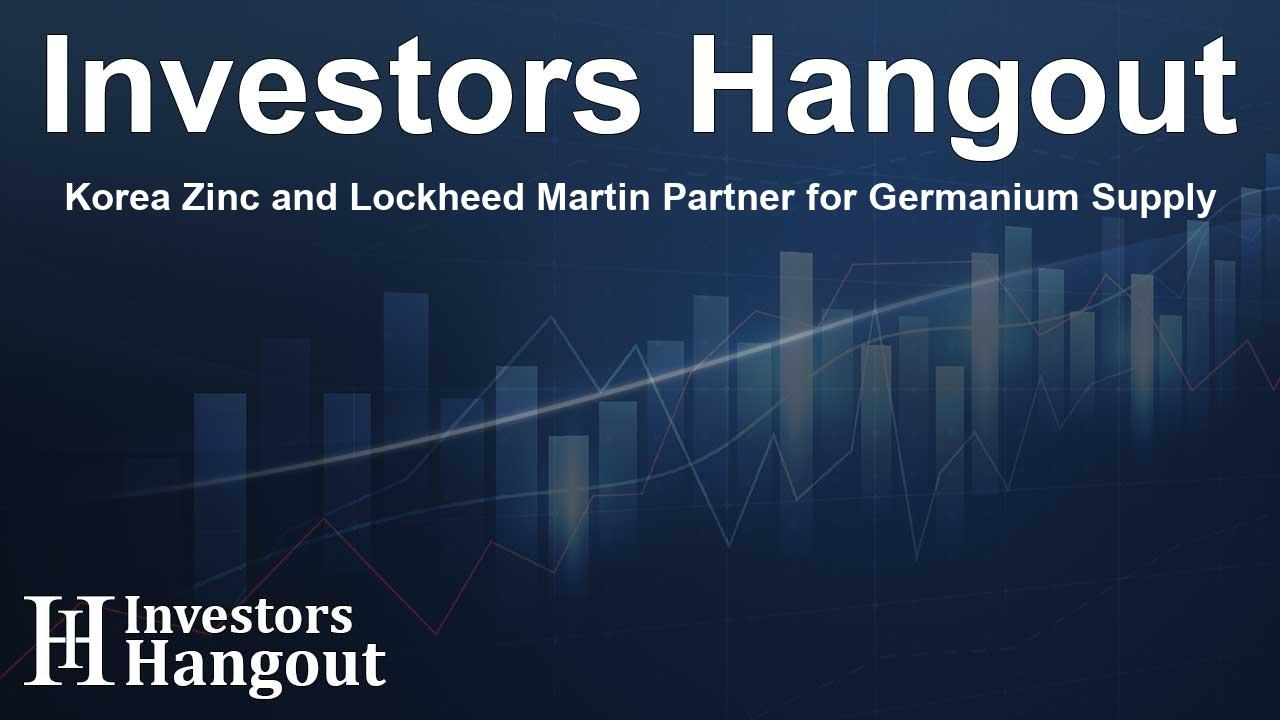Korea Zinc and Lockheed Martin Partner for Germanium Supply

Korea Zinc and Lockheed Martin Collaborate on Germanium Supply
Korea Zinc has embarked on a significant initiative to produce high-purity germanium, planning to procure its raw materials from outside conventional regions. This development aims to solidify a strategic partnership with Lockheed Martin, a globally recognized defense contractor, and enhance the stability of supply chains crucial for both national defense and advanced technology sectors.
The New Germanium Plant and Its Role
At the center of this collaboration is the newly established Germanium Plant at Korea Zinc's Onsan smelter. This plant is expected to be pivotal in supplying essential germanium materials, thereby supporting Lockheed Martin's operations, particularly in the defense and aerospace industries.
Significance of the Partnership
The signing of the Memorandum of Understanding (MOU) marks a significant milestone in Korea-U.S. partnerships, particularly concerning the procurement of critical rare metals. The agreement signifies a commitment to create a robust supply chain free from reliance on traditional producer regions, ensuring reliability and security in sourcing critical minerals.
Implications for Defense and Space Industries
This partnership is particularly timely, considering the growing demand for germanium in the defense and space industries. The metal is an essential ingredient in various technologies such as night-vision goggles, thermal imaging cameras, and advanced satellite solar panels. By ensuring stable access to germanium, both Korea Zinc and Lockheed Martin are positioning themselves at the forefront of these fast-evolving fields.
Details of the MOU and Future Plans
The MOU outlines that Korea Zinc will manage the entire production process of germanium—from mining to processing—free from the influences of certain nations that have dominated this market. In parallel, Lockheed Martin is set to negotiate an off-take agreement, reinforcing their commitment to securing this strategic resource. Planning for a long-term contract is already underway to ensure a reliable flow of materials as production ramps up.
The Growth of Lockheed Martin
Lockheed Martin has been a key player in the global defense landscape since its formation in 1995. The company has made remarkable strides in producing advanced military aircraft and missile systems. At the end of 2024, its backlog of orders reached a record USD 176 billion, highlighting its strong foothold and strategic partnerships within the defense industry.
The Importance of Germanium in Modern Technology
Germanium is more than just a metal for defense applications; it is increasingly vital across a range of technology sectors. Its uses in semiconductor devices, specialty gases for semiconductor processing, LEDs, and fiber optics reflect its versatility and importance in modern advancements. As demands in these sectors grow, the focus on sourcing stable materials becomes critical.
Korea Zinc’s Strategic Role
As a leader in strategic mineral production, Korea Zinc has previously been the sole provider of materials such as antimony and indium in South Korea. This endeavor into germanium solidifies its role as a crucial player in the supply of minerals essential for both domestic use and international export, helping secure its position in the global market.
Investment in Future Production
Korea Zinc has announced an investment of approximately KRW 140 billion to enhance its Onsan Smelter for germanium production. With plans to commence production by 2028, this initiative will not only fulfill domestic needs but also potentially set the foundation for exports to key markets.
Conclusion: Strengthening Bilateral Ties
The agreement between Korea Zinc and Lockheed Martin underscores a shared vision to fortify economic ties and bolster supply chains within the context of changing global dynamics. This partnership exemplifies the ability to adapt and respond to emerging challenges in resource availability, offering a template for future collaborations across industries.
Frequently Asked Questions
What is the main purpose of the MOU between Korea Zinc and Lockheed Martin?
The MOU aims to establish a stable supply chain for germanium, vital for defense and advanced technology sectors.
Where will Korea Zinc source its raw materials for germanium production?
Korea Zinc plans to procure raw materials outside of traditional production areas, ensuring a stable supply chain.
When is Korea Zinc expected to start production at its new plant?
The company anticipates beginning production in the first half of 2028 following trial operations starting in 2027.
How does germanium contribute to the defense industry?
Germanium is essential for night-vision technologies, thermal imaging devices, and various advanced military systems.
What is Korea Zinc’s investment in the germanium project?
Korea Zinc is investing roughly KRW 140 billion to enhance its Onsan Smelter facility for the new germanium plant.
About The Author
Contact Thomas Cooper privately here. Or send an email with ATTN: Thomas Cooper as the subject to contact@investorshangout.com.
About Investors Hangout
Investors Hangout is a leading online stock forum for financial discussion and learning, offering a wide range of free tools and resources. It draws in traders of all levels, who exchange market knowledge, investigate trading tactics, and keep an eye on industry developments in real time. Featuring financial articles, stock message boards, quotes, charts, company profiles, and live news updates. Through cooperative learning and a wealth of informational resources, it helps users from novices creating their first portfolios to experts honing their techniques. Join Investors Hangout today: https://investorshangout.com/
The content of this article is based on factual, publicly available information and does not represent legal, financial, or investment advice. Investors Hangout does not offer financial advice, and the author is not a licensed financial advisor. Consult a qualified advisor before making any financial or investment decisions based on this article. This article should not be considered advice to purchase, sell, or hold any securities or other investments. If any of the material provided here is inaccurate, please contact us for corrections.
